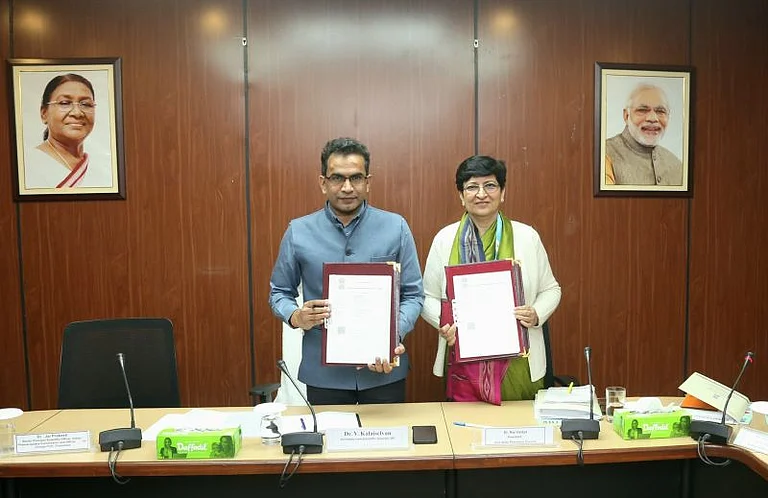One can begin answering that query by studying the course of the river Cauvery. For with it is entwined, both metaphorically and literally, the life and politics of the AIADMK general secretary. Jayalalitha was born on the banks of the Cauvery in Mysore. In '82, she performed a dance drama Cauvery thanta Kalaiselvi (The Artist gifted by Cauvery) in Madurai during the AIADMK'S tenth anniversary. This marked her formal entry into politics. A decade later, in '92, as the chief minister of Tamil Nadu, she went on a protest fast against the Narasimha Rao government for not solving the century-old Cauvery dispute. Then it was the BJP's turn. The tripartite agreement in August '98 was like a thorn in Jayalal-itha's flesh. She felt that her status as a BJP ally had been undermined, and that the party had cheated her by allowing her bete noire, chief minister Karunanidhi, to walk away with the cake she had been baking so long. The agreement resulted in the first major difference of opinion between her and the saffron party, which finally led to the collapse of the BJP government. There is, however, more to Cauvery and its links with Amma's fortunes than merely that. The river divides the state into nearly two equal halves. While south of Cauvery, Jayalalitha's political currency is very high, to its north it is negligible.
Political pundits wonder how she manages to retain her support base south of the Cauvery despite various negative developments over the past few years that should have pushed her fortunes into a nosedive. There are umpteen unsung 'factors' they can cite, which never seem to erode her appeal: the ostentatious wedding of her foster son, sundry corruption cases, her tantrums, her role in bringing down the Vajpayee government, her alliance with the Congress despite her criticism of Sonia's nationality just a year ago and the declaration of T.T.V. Dinakaran, nephew of her close aide Sasikala, as heir apparent. Her recent poll campaign, however, is proof that her support base in the southern part of Tamil Nadu is intact.
But what sustains it? It's not just film glamour—many actresses who did better than Amma on the silver screen were abject failures in the hurly-burly of politics. The crowds she's drawn in some districts have been overwhelming. Scoffs a senior MDMK leader: "The crowds are not spontaneous. She has the money to mobilise them." The late MGR's speech-writer Soolai has a different view: "It's MGR's mystique. It's the power of his symbol—two leaves. Though Jayalalitha never invokes MGR otherwise, she promptly returns to that most dependable mascot during the elections." It might also partly be due to the woman factor. Gathering to witness the spectacular Jaya cavalcade—of 100 cars, huge cutouts, ornate rostrums and the entire road being lit with neon lights—are large numbers of women. "It is a kind of sublimation for them. An average woman is subjected to various forms of male domination. Whereas in a Jayalalitha meeting, it is a complete reversal of roles. Men prostrate at her feet, and the whispering dialogue between Jayalalitha and Sasikala gives a sense of woman power," observes an AIADMK worker.
Another important factor is that in the ongoing tussle between the Thevar community's desire to retain supremacy and the Dalit political awakening, Jayalalitha has unabashedly supported the Thevars. Jayalalitha knows that her principal rival in the electoral arena is the DMK and the Dalits are not favourably inclined towards it, as they perceive the DMK to be a party of the intermediate castes. Also, the Thevars are concentrated in nearly 10 parliamentary constituencies while the Dalits are dispersed throughout the state. The interesting thing is that the issues on which the media faults Jayalalitha are the ones on which her popularity rests. Her constant bickering with the BJP government and her refusal to concede seats to the Congress, just like MGR, are seen as assertive actions. According to K. Kalimuthu, deputy general secretary of AIADMK, Jayalalitha's no longer seen as a regional satrap but a national leader who's going to guide the destiny of the country in the new millennium. The other crucial issue of corruption has also had minimal impact. The constant changes in the alliances and the growing cynicism about the political class in general has taken the sting out of the corruption campaign, which played a big role in the '96 elections. However, the most important factor that draws crowds to Jayalalitha's meeting is curiosity value. She rarely appears in public. She has carefully cultivated an image whereby if she steps out of her fortress-like bungalow in Poes Garden, it becomes an event. Also of some importance is the fact that she's started her campaign early, leaving the opposition to answer her points. Hers, clearly, is a strategy of attack being the best defence. Whether it clicks or not is, of course, another question.


























